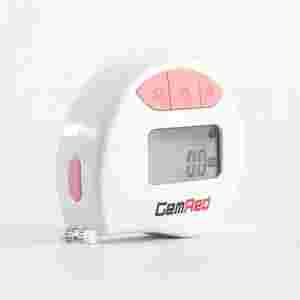Feb 24,2023

Accuracy is crucial when it comes to medical diagnoses. Medical personnel must use the greatest measuring equipment on the market to accomplish this. The top 10 medical measuring devices for precise diagnosis, including pulse oximeters, thermometers, and blood pressure cuffs, are covered in this article.
In the diagnosis and treatment of patients, medical measuring devices are essential. These devices support the monitoring and measurement of vital signs such as blood pressure, heart rate, temperature, and oxygen saturation by medical experts. To effectively diagnose and track a variety of medical disorders, precise measurement equipment is crucial. In this post, we'll look at the top 10 measuring devices that doctors use to provide precise diagnoses on a daily basis.
One of the most popular and widely used medical measuring devices is the blood pressure monitor. These tools make it easier for medical personnel to assess a patient's blood pressure precisely. Digital and manual blood pressure monitors are just two of the many varieties available. Because they are simple to use and precise, digital blood pressure monitors are widely used. They offer rapid readings and can save several readings for later use.
Upper arm monitors and wrist monitors are the two primary categories of blood pressure devices. The most precise and widely used upper arm monitors in medical facilities. They are available in manual and digital varieties. Digital blood pressure monitors employ an electronic sensor to detect blood pressure, as opposed to manual blood pressure monitors, which use a stethoscope and a cuff.
Compared to upper-arm monitors, wrist monitors are more compact and portable, making them the best choice for at-home monitoring. However, due to the device's location in relation to the heart, wrist monitors may be less accurate than upper arm monitors.
The best blood pressure monitors on the market include Omron 10 Series Wireless Upper Arm Blood Pressure Monitor, Withings BPM Connect, and the Beurer BM55 Upper Arm Blood Pressure Monitor. These devices are accurate, reliable, and user-friendly.
Thermometers are another essential medical measuring tool. They are used to measure a patient's body temperature accurately. There are different types of thermometers, including digital, tympanic, and infrared.
Digital thermometers are the most commonly used type of thermometer in medical facilities. They are easy to use and provide quick and accurate temperature readings. Tympanic thermometers use infrared technology to measure the temperature inside the ear canal. Infrared thermometers are non-contact devices that use infrared technology to measure the patient's temperature from a distance.
The best thermometers on the market include the iProven DMT-489, Braun Thermoscan 7, and Vicks SpeedRead V912US Digital Thermometer. These devices are easy to use, accurate, and provide quick temperature readings.
Pulse oximeters are medical measuring tools used to measure a patient's oxygen saturation levels. These devices are commonly used in emergency rooms, hospitals, and medical facilities to monitor a patient's respiratory rate and oxygen levels.
There are two types of pulse oximeters: fingertip and handheld. Fingertip pulse oximeters are small and portable, making them ideal for at-home use. Handheld pulse oximeters are larger and more accurate, making them ideal for medical facilities.
The best pulse oximeters on the market include the Innovo Deluxe Fingertip Pulse Oximeter, Santamedical Generation 2 Fingertip Pulse Oximeter, and the Zacurate Pro Series 500DL Fingertip Pulse Oximeter.
Accurate measurements in medicine are critical in ensuring that patients receive the right treatment. Healthcare professionals use medical measuring tools to get precise measurements of different aspects of the body, including height, weight, blood pressure, temperature, and oxygen saturation. These measurements can provide insight into a patient's overall health and can be used to diagnose, treat, and monitor a wide range of medical conditions.
Medical measuring tools are also used to measure medication dosages accurately. This is particularly important in critical care situations where medications are given in small and precise amounts. An error in dosage measurement can lead to potentially fatal consequences, making the use of accurate medical measuring tools vital in patient care.
Medical measurements are also used to track progress and recovery over time. Healthcare professionals can use changes in measurements to assess whether treatments are working or if adjustments need to be made.
There are numerous medical measuring tools that healthcare professionals use to gather accurate measurements. Some of the most common ones include:
Sphygmomanometers: Used to measure blood pressure, this device has a cuff that is inflated and then deflated to measure the pressure in the arteries.
Stethoscopes: Used to listen to the heart, lungs, and other internal organs, stethoscopes can provide important diagnostic information to healthcare professionals.
Thermometers: Used to measure body temperature, thermometers can be used orally, rectally, or in the ear.
Weighing Scales: Used to measure a patient's weight, these scales can help healthcare professionals monitor changes in body weight over time.
Pulse Oximeters: Used to measure the oxygen saturation levels in a patient's blood, these devices are often used in critical care situations.
Spirometers: Used to measure lung function, these devices can help healthcare professionals diagnose and monitor respiratory conditions.
Tape Measures: Used to measure different parts of the body, including height, waist circumference, and head circumference, tape measures can provide valuable information about a patient's overall health.
Medical measuring tools are an essential part of modern healthcare. They provide accurate measurements that can be used to diagnose, treat, and monitor a wide range of medical conditions. From measuring blood pressure to tracking weight changes over time, these tools help healthcare professionals provide the best possible care to their patients.
As technology advances, medical measuring tools are becoming more sophisticated, accurate, and user-friendly. This means that healthcare professionals can provide even better care to their patients, ensuring that they receive the right treatments at the right time.
So, whether you are a healthcare professional or a patient, it is essential to understand the importance of medical measuring tools and how they can help improve healthcare outcomes.